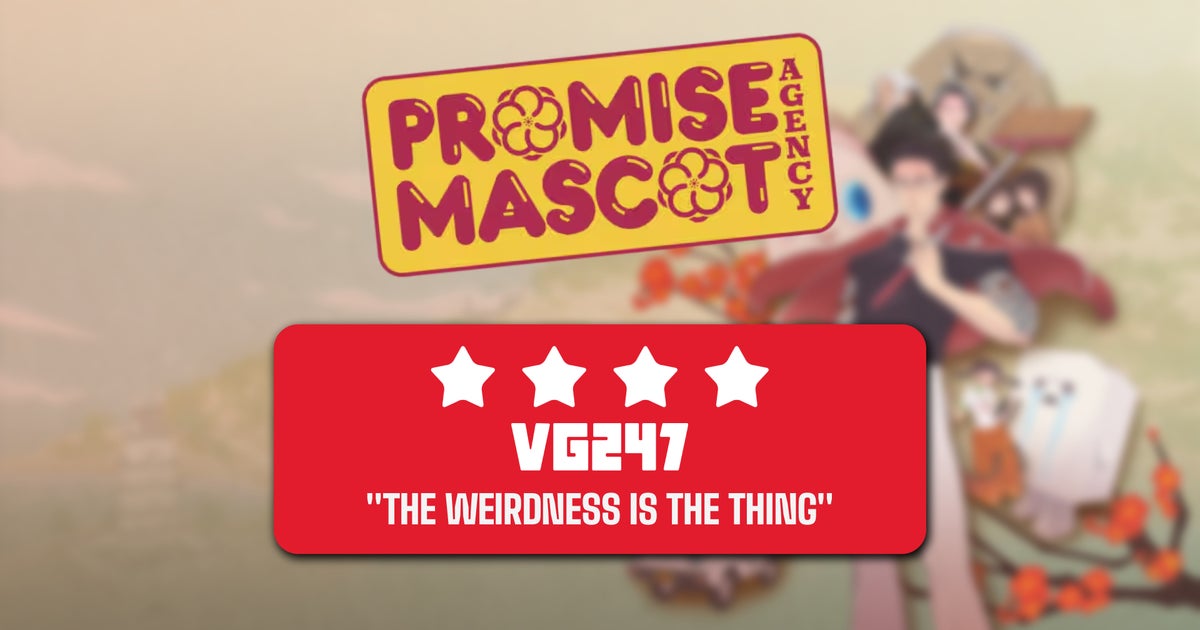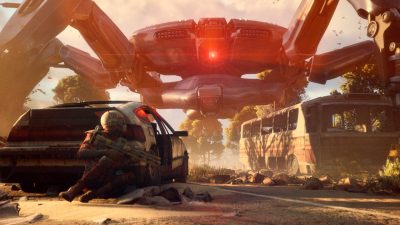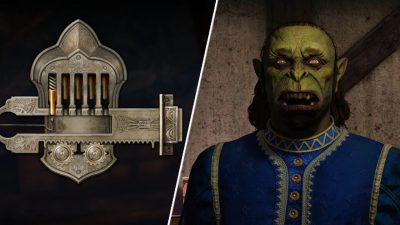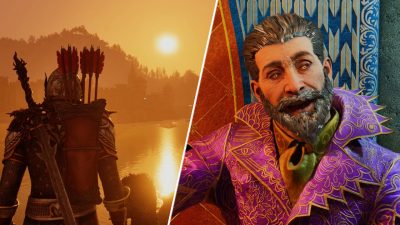It probably won’t surprise you to hear this.
When it comes to Promise Mascot Agency – a game about a psychotic finger mascot and a guy with a broom trying to unravel the Yakuza secrets within a cursed and run-down town, inhabited by a duck voiced by former PlayStation exec Shuhei Yoshida – the weirdness is the thing.
I had a feeling it would be after I played the first couple of hours of the game that developer Kaizen Game Works put out as a demo prior to release. Having now driven through the entire thing in a kei truck that sprouted wings towards the end, I can tell you unequivocally that it’s the case. The weirdness is the thing, and if you’re going to fall in love with this indie mascot management game, it’s the part that’ll seduce you, like you’re an evil vending machine that’s just started spitting junk everywhere because a moss ball with legs forgot that appliances don’t respond well to violence.
There are some points when PMA pretends to be normal. The setup of its story (aside from revolving around a crew featuring a grizzled finger mascot who’s permanently smoking a cigar) is very serious and surprisingly lore-heavy. Protagonist Michi Sugawara – dubbed The Janitor because he’s good at cleaning s**t up – is a key cog in the Shimazu Family, and is tasked alongside his oath brother Tokihira with delivering a bunch of cash to another Yakuza syndicate as part of a deal to secure underworld peace forever between three of Japan’s biggest crim collaborations.
Naturally, because we can’t have nice things, it goes wrong. Instead of killing him to help save her own hide, Michi’s boss Matriarch Shimazu instead sneakily ships him off in a box to try and earn back the money via a secret business the family controls that no one knows about. That’s the defunct mascot agency in the rural town of Kaso-Machi, which is re-named Promise Mascot Agency when Michi re-opens it alongside the aforementioned non-cigar smoking psycho finger – Pinky.
From here, you’re in the mascot management business, and your job is to build up the agency by establishing a crop of mascot talent, chatting to people who know of locations and businesses in town that might want to hire them for events, and making sure those jobs get done. Different mascots will suit different jobs better due to their traits – an event at a restaurant is a good place to send a food-themed mascot like a matcha roll that’s also a cat, while an event at the cemetery is the ideal place to send a mascot shaped like a funeral urn. However, if you just need the money, so long as they’ve got enough stamina, you can send ‘em anywhere.
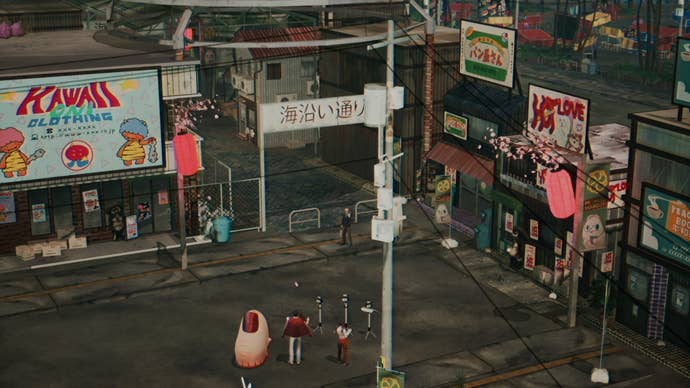
Once they’re away, stuff might go wrong, at which point you’ll get an alert to respond to via the game’s initially intimidating, but actually pretty simple, mascot job menu. You’ve usually got at least a few in-game hours to respond, and when you do you’ll be whisked off to the livestream of the event where, after a quick intro that sees a mascot host that vaguely reminded me of Michael McIntyre (read: slightly annoying hack) say stuff like “Ichigo Love has absolutely ****** it”. You’re drafted in to save the mascot by deploying ‘mascot hero cards’ to deplete the issue/hostile entity’s health bar. If you succeed, you’ll get the full rewards for the job and, if you fail, you’ll simply get the base rate.
So runs the basic cycle of the management side, but as you explore Kaso-Machi and grow the agency, plenty of additional layers are added into the mix to boost the complexity and keep you on your toes to a pretty frenetic degree assuming you’re trying to maximise your earnings. That’s certainly something the game gives you impetus to do right out of the gate, as on top of paying your own bills on a regular basis, you have to visit ATMs and send cash to Matriarch Shimazu in order to help her stay one step ahead of the Yakuza knives of Damocles that are hanging over her head following the botched job.
The result, especially as you’re getting your feet under you, is that your business-running comes with a pretty strong sense of urgency. You’re spending money to grow and keep your boss alive just as quickly as you earn it, and I even ended up ever so slightly in the red at one point. At that stage, the management side of the game maybe feels a bit atmospherically out of step with the other side of Promise Mascot Agency – exploring the sleepy, stylishly run-down town of Kaso-Machi and its generally pretty mountainous surroundings in Michi and Pinky’s kei truck.
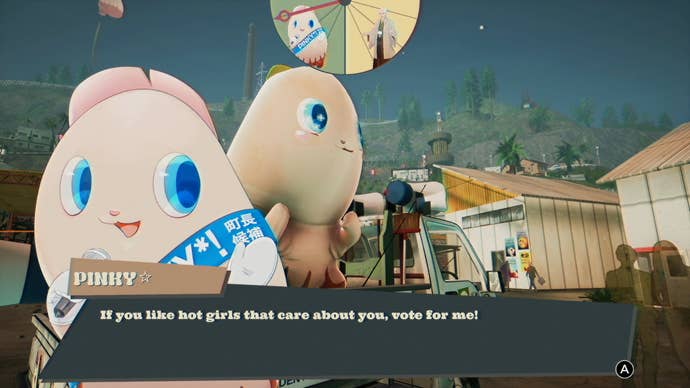
It’s through exploring that you not only cross off objectives in the main story; Michi and Pinky’s unravelling of the mystery that surrounds Kaso-Machi’s legendary Yakuza-killing curse and its comically corrupt mayor’s misuse of a government granted rejuvenation fund. You’ll also discover a range of different items and tick off tasks to aid you in running the agency. There are townspeople to recruit as mascot hero cards you can then upgrade by completing their radiant quests, which usually involve running around the town collecting five or six of a specific item, stuff to pick up (like new types of mascot merch) and, most importantl, more mascots to add to your weirdo workforce.
In order to convince a mascot to join you, you’ll need to negotiate with them. As I progressed I found that actually offering a good package out of the gate seemed to pay dividends; low-balling them doesn’t quite cut it. Welcome to the real world, kids.
Every mascot has stats like popularity, motivation, and stamina. While you will naturally boost these just by sending a mascot out on more jobs, making them happier from the beginning means you start that journey further along the road. Plus, I found that offering perks like holiday days actually fits pretty well into the ideal cadence of the game, with mascots taking a 24 hour break that actually boosts their stamina recharge, rather than just being left on the sidelines until they’ve recovered.
Here’s the thing, though. Above all else, you’ll want to treat your band of employees well, just because of their weird and wonderful personalities. There’s a lovely amount of unique variety in terms of the mascot cast Kaizen and their collaborators have put together, with each one having a three-part life satisfaction journey they go on as you increase your bond with them. All of these are tailored to each mascot’s diverse personality, but they all roughly revolve around you helping the mascot to achieve a goal that’ll improve its life.
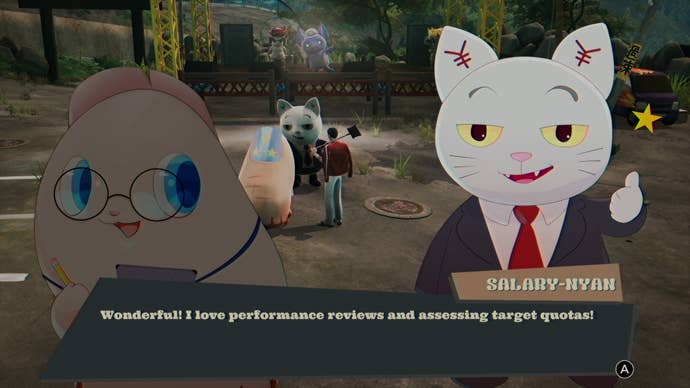
For example, my favorite mascot, Karoushi – a terrifying black cowl with a face that lives in a haunted tunnel – serves as a metaphor for burnout, and only speaks in grandiose allegorical passages that belong in an Italo Calvino novel. Their story was about overcoming the trauma of working too hard and helping some locals unionise.
In keeping with the game’s theme of keeping promises to help folks achieve their dreams, most of the townspeople you meet also have arcs like this through their town quests. Kaso-Machi’s an interesting place to explore, with a cool mix of run-down rural vibes and slightly cartoonish spookiness in the form of places like the haunted tunnel which literally treats you to a black and white filter accompanied by creepy noises every time you drive through it.
As with the mascots, you can tell pretty much every area and person has had plenty of thought and care put into shaping them and their backstory. Plus, Kaizen’s done a good job of ensuring the town changes visually as you renovate different neglected areas of it to establish new mascot events spots – with the passive income generated by that being the game’s best high-cost, high-yield money earner for the agency.
One minor hangup is that the game’s map indicates where you can find every useful item and person in the world by default. This makes sense in terms of the major characters/landmarks, but it does take some sting out of the exploration knowing that, for example, if you trek out to one of the islands surrounding Kaso-Machi, you’ll find exactly one item. You still have the fun of uncovering what exactly that item is, but the element of mystery’s diluted a bit.
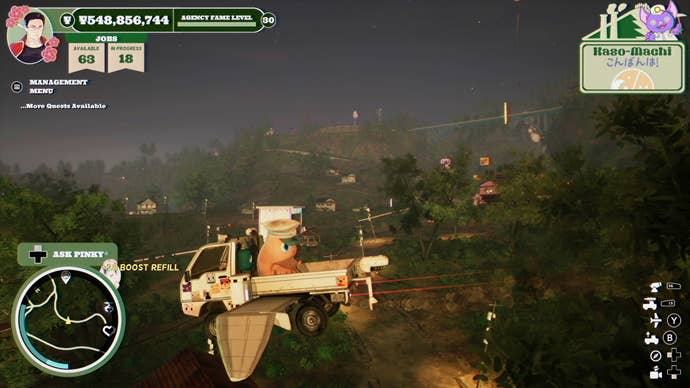
Another aspect I didn’t quite vibe with mechanically was the mini-game by which you deliver mascot merch to different shops around town – another of the game’s big money-earners. Basically, once you find a merch item out in the world, it gets added to giant arcade claw machines around the map as toys, which you then have to pick up using the painfully slow claw in order to get shipments to distribute.
It’s a cool concept that fits the game’s theming perfectly in theory, but in practice, it was the element of gameplay I found by far the most monotonous. Meanwhile, subcontracting mascots in other cities – the third member of PMA’s ‘here come the big bucks’ trio – is a lot more stripped back. You buy access to locations, find the business cards of mascots to man them, and boom, a decent chunk of passive income.
There is a point some way through the game where you suddenly seem to go from having lots to do, but also have a constant need for that money, to having lots to do, but much more money than you have stuff to spend it on. By that point, the main story’s kicking into high gear, so it’s nice to not have to worry about grinding as much.
As for that main story, how much you’ll enjoy it comes down to what I mentioned at the start. It helps to be into Yakuza tales that aren’t afraid to get a bit silly, but the weirdness is the thing that will likely decide where PMA lands on the ok to great game spectrum for you. For some, the array of genuinely funny and touching moments that surround everything from minor interactions to major plot beats will make this proper cult classic material. For others, the in-your-face wackiness might not mesh with their sense of humour, leaving their verdict in the realm of just fine.
Promise Mascot Agency’s a good time. Uniquely charming enough that it doesn’t fall into the trap of being as dry as Michi’s ideal Saturday night, but with enough rough edges that it’d need to work on itself a bit before it could run for mayor of whichever cursed town all of the truly great games inhabit.
Promise Mascot Agency launches on April 10 for PlayStation 5, Nintendo Switch, Microsoft Windows, Xbox Series X and Series S. This review was written using a PC code provided by the developer.




